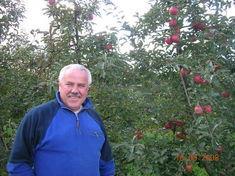
Tomasz Koscianek, pictured, a third generation fruit farmer, runs an orchard farm in the Grójec region of Poland, which is sometimes called “the biggest orchard in Europe”.
Koscianek is concerned about the upcoming changes to EU pesticide legislation, in particular the calls from the European Parliament to drastically reduce the amount of pesticides that can be used. “Today, consumer expectations are much higher than they were 10 years ago. I know well what it means to care about the environment, but it is not possible to reduce protection - it would be like trying to fight pests by walking into the field with a hammer and anvil. In the past, I believed that I could use smaller amounts of pesticides in order to protect the environment. Therefore, I delayed treatments against apple scab. Consequently, when the disease broke out, I had to apply three treatments instead of one.
“In our region, less than five per cent of fruit farmers apply orchard protection treatment at random,” continues Koscianek. “But I cannot use these products carelessly, because I am aware of how much they cost. During the growing season, my one-hectare quarters of the orchard are inspected twice a week. And if I have problems with the two-spotted spider mite in one of these quarters, this does not mean that I will apply treatment to the entire farm. Economic calculation is important! It is more cost-effective to walk through the orchard and inspect particular quarters than to spray thoughtlessly. Three years ago, we were able to buy very modern sprayers that enabled us to apply treatment within a few hours. We can tell in a very precise way how much time we spend on the application of particular products. We do not perform any unnecessary treatments -we protect only those quarters of the orchard that need protection!”
Koscianek also spoke about creating resistance among pests by not using a varied enough portfolio of plant protection solutions. “I know what happens when only one type of product is used. In the past, we tried just using one product intensively, and have since learned that different products should be used. Otherwise, we create a dangerous situation - we ourselves create resistance. Unfortunately, I’m afraid that the proposed regulations on plant protection will create just this effect.”
Koscianek emphasised the importance of training and advisory programmes. “Fruit farmers need a larger number of reliable advisors who will share responsibility with us for plant protection, among other things,” he said. “Agricultural production requires continuous learning, and I would like the European parliament to focus its attention on this problem. We need advisors on various topics.
“Effective crop protection requires continuous learning and care-taking. We note each change in weather conditions, as this has a strong impact on the products used and time of application, as well as determining whether treatment is needed or not. I believe that the European parliament should provide us with the best possible knowledge about protecting agriculture, our health and the environment in Europe, just as we farmers know best how to apply this knowledge in practice.”
Koscianek thinks a great deal about the future and what lies ahead for European agriculture. “My son will get married soon. Our farm will get larger. This will be a big challenge for the fourth generation of fruit farmers in this area.”



